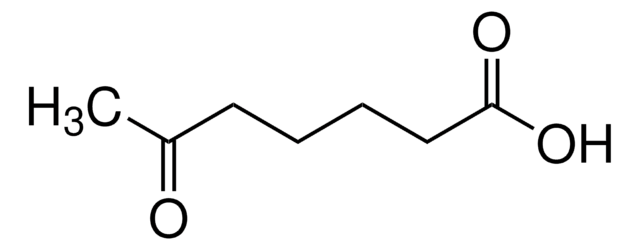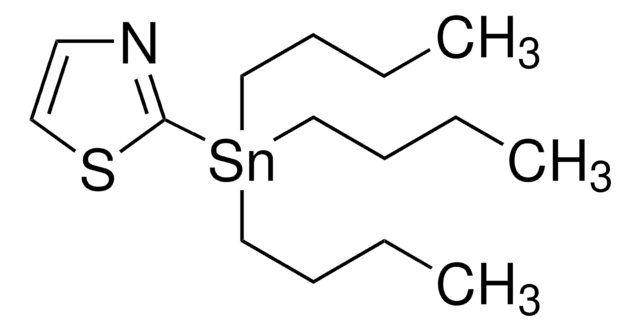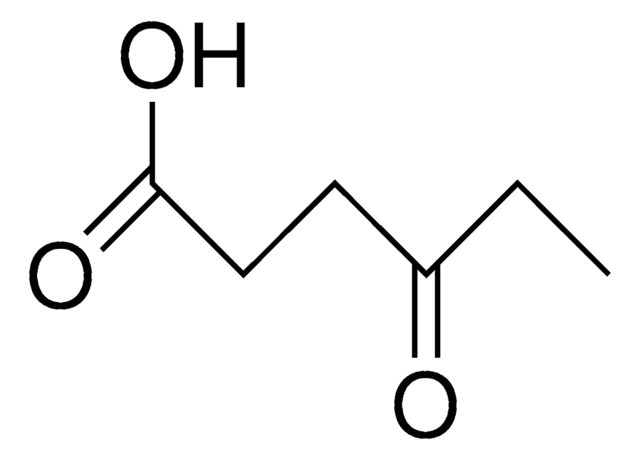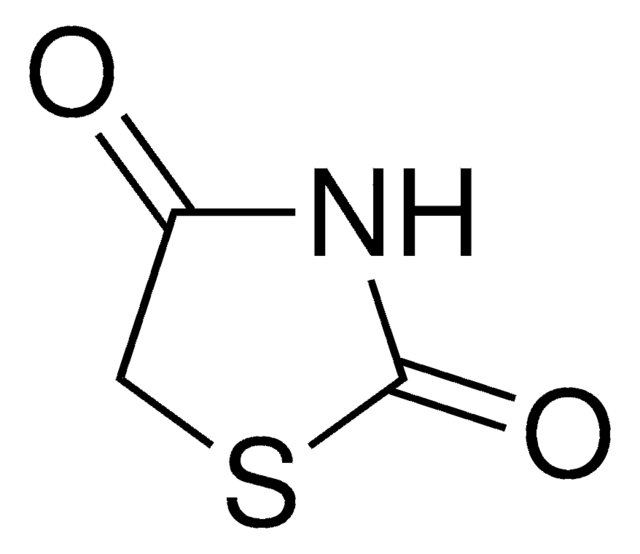A13204
4-Acetylbutyric acid
97%
Synonym(s):
5-Ketohexanoic acid
Sign Into View Organizational & Contract Pricing
All Photos(1)
About This Item
Linear Formula:
CH3CO(CH2)3CO2H
CAS Number:
Molecular Weight:
130.14
EC Number:
MDL number:
UNSPSC Code:
12352100
PubChem Substance ID:
NACRES:
NA.22
Recommended Products
Quality Level
Assay
97%
form
liquid
refractive index
n20/D 1.4451 (lit.)
bp
274-275 °C (lit.)
mp
13-14 °C (lit.)
density
1.09 g/mL at 25 °C (lit.)
SMILES string
CC(=O)CCCC(O)=O
InChI
1S/C6H10O3/c1-5(7)3-2-4-6(8)9/h2-4H2,1H3,(H,8,9)
InChI key
MGTZCLMLSSAXLD-UHFFFAOYSA-N
Application
4-Acetylbutyric acid may be used in the preparation of the following compounds:
- 5-hydroxyhexanoic acid
- 6-methyl1-3,4-dihydro-pyran-2-one, precursor for 5-acetyl-tetrahydro-2-(3H)-furanone
- substituted N-aminolactams
- (±)-5-methyl-δ-valerolactone
Storage Class Code
10 - Combustible liquids
WGK
WGK 3
Flash Point(F)
Not applicable
Flash Point(C)
Not applicable
Personal Protective Equipment
dust mask type N95 (US), Eyeshields, Gloves
Choose from one of the most recent versions:
Already Own This Product?
Find documentation for the products that you have recently purchased in the Document Library.
Customers Also Viewed
A versatile and concise route to functionally substituted ?-butyrolactones and spiro-XXX-butyrolactones (lactone annelation)
Mandal AK and Jawalkar DG
Tetrahedron Letters, 27.1, 99-100 (1986)
Jie Yao et al.
Water science and technology : a journal of the International Association on Water Pollution Research, 79(11), 2195-2202 (2019-07-19)
The monoterpene alcohol α-terpineol is extensively used as the foaming agent in mineral processing and can be released to environment along with the wastewater. This study evaluated the feasibility of eliminating α-terpineol in water by ultraviolet irradiation (UV) in combination
(2S, 6S, 8S)-2, 8-Dimethyl-1, 7-dioxaspiro [5.5] undecane: A natural spiroacetal lacking anomeric stabilisation
Chen J, et al.
Tetrahedron Asymmetry, 6.4, 967- 972 (1995)
Proline-like β-turn mimics accessed via Ugi reaction involving monoprotected hydrazines.
Krasavin M, et al.
Tetrahedron Letters, 51(10), 1367-1370 (2010)
Identification of 5-hydroxyhexanoic acid, 4-hydroxyheptanoic acid and 4-hydroxyoctanoic acid as new constituents of bacterial polyhydroxyalkanoic acids.
Valentin HE, et al.
Applied Microbiology and Biotechnology, 46(3), 261-267 (1996)
Our team of scientists has experience in all areas of research including Life Science, Material Science, Chemical Synthesis, Chromatography, Analytical and many others.
Contact Technical Service












